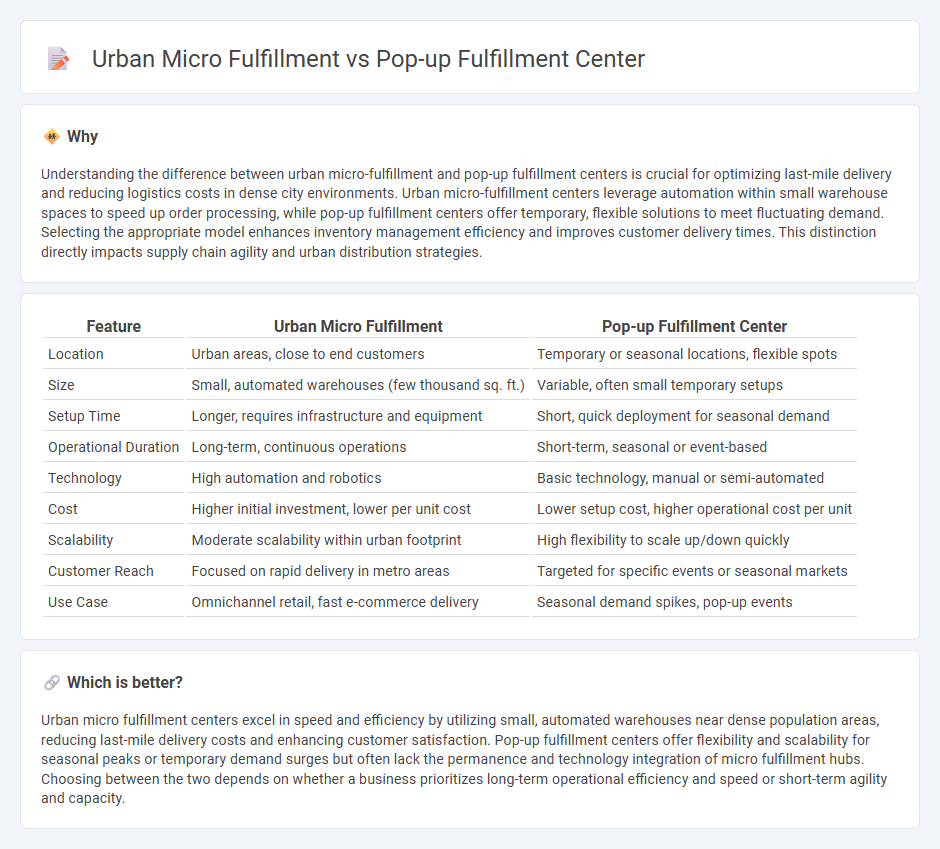
Urban micro fulfillment centers optimize last-mile delivery by utilizing small, automated warehouses situated close to customer clusters, significantly reducing shipping times and costs. Pop-up fulfillment centers offer flexible, temporary storage solutions during peak demand periods, enabling retailers to quickly ramp up capacity without long-term commitments. Explore the advantages and operational differences between these innovative fulfillment strategies to enhance your supply chain efficiency.
Why it is important
Understanding the difference between urban micro-fulfillment and pop-up fulfillment centers is crucial for optimizing last-mile delivery and reducing logistics costs in dense city environments. Urban micro-fulfillment centers leverage automation within small warehouse spaces to speed up order processing, while pop-up fulfillment centers offer temporary, flexible solutions to meet fluctuating demand. Selecting the appropriate model enhances inventory management efficiency and improves customer delivery times. This distinction directly impacts supply chain agility and urban distribution strategies.
Comparison Table
| Feature | Urban Micro Fulfillment | Pop-up Fulfillment Center |
|---|---|---|
| Location | Urban areas, close to end customers | Temporary or seasonal locations, flexible spots |
| Size | Small, automated warehouses (few thousand sq. ft.) | Variable, often small temporary setups |
| Setup Time | Longer, requires infrastructure and equipment | Short, quick deployment for seasonal demand |
| Operational Duration | Long-term, continuous operations | Short-term, seasonal or event-based |
| Technology | High automation and robotics | Basic technology, manual or semi-automated |
| Cost | Higher initial investment, lower per unit cost | Lower setup cost, higher operational cost per unit |
| Scalability | Moderate scalability within urban footprint | High flexibility to scale up/down quickly |
| Customer Reach | Focused on rapid delivery in metro areas | Targeted for specific events or seasonal markets |
| Use Case | Omnichannel retail, fast e-commerce delivery | Seasonal demand spikes, pop-up events |
Which is better?
Urban micro fulfillment centers excel in speed and efficiency by utilizing small, automated warehouses near dense population areas, reducing last-mile delivery costs and enhancing customer satisfaction. Pop-up fulfillment centers offer flexibility and scalability for seasonal peaks or temporary demand surges but often lack the permanence and technology integration of micro fulfillment hubs. Choosing between the two depends on whether a business prioritizes long-term operational efficiency and speed or short-term agility and capacity.
Connection
Urban micro fulfillment centers and pop-up fulfillment centers both enhance last-mile delivery efficiency by positioning inventory closer to dense urban populations. These facilities leverage compact spaces to expedite order processing and reduce delivery times through strategic location and technology-driven automation. Their integration supports agile supply chains, meeting increasing consumer demand for faster e-commerce fulfillment in metropolitan areas.
Key Terms
Location Strategy
Pop-up fulfillment centers leverage temporary, strategic locations near key urban markets to rapidly scale delivery capabilities during peak demand periods, while urban micro fulfillment centers are permanent, small-scale warehouses embedded within dense city environments to optimize last-mile logistics and reduce shipping times. Location strategy for pop-up centers prioritizes flexibility and proximity to transient customer hotspots, contrasting with micro fulfillment centers' emphasis on fixed urban real estate to support consistent, high-frequency order fulfillment. Explore how integrating pop-up and micro fulfillment units can enhance your overall supply chain resilience and customer satisfaction.
Order Proximity
Pop-up fulfillment centers prioritize order proximity by temporarily locating inventory near high-demand urban areas to reduce delivery times during peak seasons or promotional events. Urban micro-fulfillment centers maintain permanent, compact facilities within city limits, leveraging automation to handle frequent, small-batch orders swiftly and efficiently. Explore the differences in scalability and operational strategies between these fulfillment models to optimize urban logistics.
Inventory Turnover
Pop-up fulfillment centers offer temporary storage solutions to rapidly increase inventory turnover during peak demand periods by placing products closer to consumers. Urban micro fulfillment centers use automation and compact spaces to maintain a steady flow of inventory, reducing lead times and enhancing turnover rates in dense metropolitan areas. Explore the advantages of each approach to optimize your inventory management strategy.
Source and External Links
Pop-Up Distribution Centers Overcome Last-Mile Delivery Obstacles ... - Pop-up fulfillment centers, also called micro-fulfillment centers, are flexible, temporary distribution hubs that bring goods closer to customers to speed delivery and reduce supply chain friction, especially useful during demand spikes like the COVID-19 pandemic.
Pop-up Distribution Centers - PFS Commerce - Pop-up fulfillment centers allow retailers to set up temporary, localized operations for hours to months, improving delivery speed and customer experience by decentralizing inventory without the high costs of permanent facilities.
Creating a "Pop-Up Distribution Center" In Your Warehouse - Pop-up fulfillment centers can be created inside existing warehouses as smaller dedicated areas to accelerate order processing, packing, and shipping, reducing handling time and improving peak season fulfillment efficiency.
 dowidth.com
dowidth.com